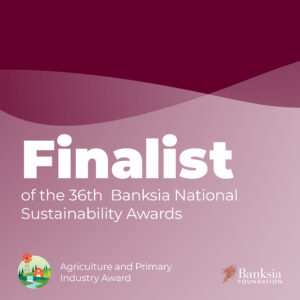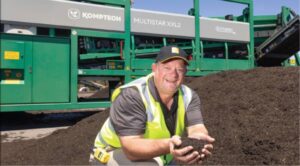Kim at Farmer’s Market Mt Lawley
Kim and Penny Hack started their 65 hectare farm in 1994 in York. Kim described the decision to go down the organic path as a “no brainer”.
“Who would want to spray poisons on their land?” he asked.
Penny was always attracted to the sustainable approach and Kim’s cousin, who had achieved National Association of Sustainable Agriculture Australia (NASAA) organic certification for growing sheep and wheat in the South West, piped up one day and suggested they give organic accreditation a go. Kim and Penny have now been accredited under the same scheme for over a decade.

Penny with some of the organic produce
While the main crop is olives for oil and table olive production they are also growing organic rye for Bodhi’s Bakehouse in Perth. Wheat is grown for the chooks. Preserved lemons, olive tapenade and seasonal fruit add to the product range. I am off to the market this Saturday to pick up a bottle of Kim’s Shiraz red wine vinegar as well as a bucket of “the mother” culture to kick off my own vinegar brew.

There are 10 olives varieties grown on the farm including Frantoio and Nevadillo blanco for oil. Kim reckons the Nevadillo produces the best oil on the planet.
“It’s rich and fruity and just devine” he said.
Table olive varieties include the standby varieties Verdello, Manzanillo and Kalamata. In the early years they hand harvested the crop over 4 months and used an 80kg “baby” mat press to hand crush the olive fruit. As the crop grew rapidly this method went out the window. Mechanical shakers can take off the entire crop in two days.

Water is the key to productivity and wind power supplies the necessary energy
I asked how they market their products. Kim said that the main outlets were farmers markets down in the city and most of the organic shops in Perth. He and Penny attend the Clontarf Farmers markets in Manning, the Kyilla Primary School market in Mt Lawley and the South Fremantle Senior High School farmers market in Beaconsfield.
He loves the social aspect of farmers market where they form very friendly relationships with customers and their families. The customers in turn really appreciate being able to “put a face to their food”, says Kim. Running a two person farm is very busy and time eating says Kim so its a good thing that we do get some social life at the markets as there is precious little time during the rest of the week at home. The main income comes from sales of certified organic Extra Virgin Olive Oil and table olives, both green and black.
A musician friend Ross Bolleter, a pianist and composer, created an installation of 14 “ruined pianos” on which the public were invited to play, at the Perth Institute of Contemporary Arts. The piece drew lots of interest and attention but when it came time to remove it from the gallery Ross called up the Hacks and asked if they would like to take the old and decaying instruments and display them at the farm. The rest as they say is history and now the farm boasts the largest collection of ruined pianos in the country. They keep on arriving from all around WA. While the idea gave a focus for visitors to the farm unfortunately the property is difficult to find and the disruption to production made the micro tourism initiative unworkable. CDs however, are still available of some of Ross Bolleter music, created on the ruined pianos of Wambyn Farm.

A ruined piano calling out for a ruined pianist
I asked what it meant to be a fully accredited organic producer and what was involved in the day to day running of the farm? Kim replied “A wise man once said that your not growing olives in our case, but you are growing soil.” No pesticides are used on the farm because all these do is destroy vital soil biology. He practices composting on a broad scale by turning pasture weeds back into the soil. Apart from breaking the weed cycle the organic matter adds to soil carbon. He does add an organic poultry manure as well as fish and kelp products to the soil.
How well does it work? One example I was given was their rye crop – it grew so tall that they had great difficulty in harvesting the grain with their header. The tall straw goes back into the soil to build carbon reserves so overall, size is a positive. The couple practice rotational cropping where they will grow crops for two years then live the field fallow for the following year just turning in the weeds as required.
The farm is also a low energy consumer with all irrigation gravity fed and all power for the house from solar collectors.
Kim is concerned about the chemical residues in the food most consumers eat and wonders why health authorities don’t seem to be testing or reporting on this. He has great faith in the spending power of ordinary people to change the tide and deliver healthier food. He has witnessed the power of such grass roots thinking particularly at farmers markets where the demand for healthy, nutritious, organic produce is changing the way farmers grow food.







